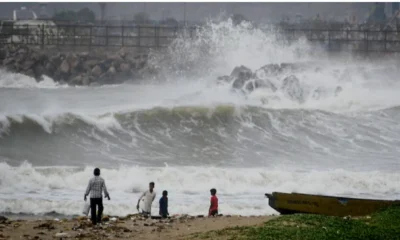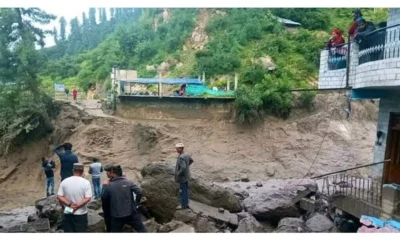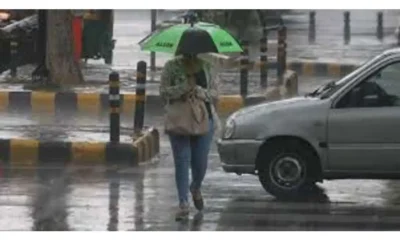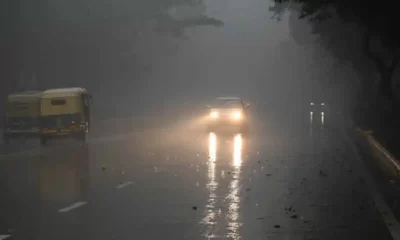[vc_row][vc_column][vc_column_text]The Southwest monsoon that accounts for about 75 per cent of rainfall in India and is the most anticipated weather phenomenon in the country is likely to miss its date with Kerala on June 1 and arrive a few days late.
The India Meteorological Department (IMD) forecast for 2019 released today (Wednesday, May 15), as reported by The Indian Express (IE) and The Hindu, says it would hit the Kerala coast six days late, on June 6. Private weather forecaster Skymet puts its arrival date as June 4.
In 2017, the onset over Kerala happened two days in advance (May 30) whereas in 2018, the onset was realised on May 29, which was three days preceding the normal onset date over Kerala.
In Andaman and Nicobar islands, the IMD said, monsoon will arrive towards the end of this week, later than normal. It usually arrives over the islands anytime between May 10 – May 15.
“Conditions are becoming favourable for monsoon to advance onto Andaman and Nicobar islands around May18 or May 19,” the forecast suggested.
Generally, the monsoon reaches Kerala within 10 days of reaching the Andamans. However, meteorologists had indicated that the monsoon — impeded by high temperatures in the seas surrounding India, and an El Nino — will advance sluggishly after reaching Kerala.
To forecast the monsoon arrival, the IMD uses a customised weather model which, it stated, had been wrong only once – in 2015 – since 2014.
This model crunches 6 meteorological parameters: the minimum temperatures over northwest India; the pre-monsoon rainfall peak over south Peninsula; the outgoing long-wave radiation (OLR) over the South China Sea; the lower tropospheric zonal wind over southeast Indian Ocean; the upper tropospheric zonal wind over the east equatorial Indian Ocean; and the outgoing long-wave radiation (OLR) over the southwest Pacific region.
The model has a built-in error margin of four days and prediction of aJune 6 onset can mean any day from June 2-10.
The monsoon’s arrival time, the IMD said, had no bearing to the quantum of rainfall in June-September period.
The IMD said it expected a “normal monsoon” but pointed to a “significant probability” of below normal rains.
But the Skymet forecast could e reason for worry. Skymet has maintained, in line with its earlier forecast, that the rains would be poor this year at 93 per cent of the normal.
According to its forecast, the drought-affected regions of Marathwada and Vidarbha in Maharashtra, along with parts of Gujarat and Madhya Pradesh, will face nearly 9 per cent deficiency in the June-September rains, reported The Business Standard (BS).
Rajasthan, northern Karnataka and Rayalseema could also see poor rain, Skymet said. While the model error for the amount of rain is 5 per cent, that for the date of arrival is two days.
“All four regions are going to witness lower than normal rain this season. East and northeast India and the central parts will get poorer rain than northwest India and the southern peninsula,” Jatin Singh, managing director at Skymet, was reported as saying.
The initial advance of the monsoon over peninsular India in June is going to be slow, the weather agency said. What does not augur well for the economy is that Skymet expects multiple agrarian regions to have a serious shortfall in rain.
On the other hand, observations by global weather agencies that show weaker El Nino conditions in the monsoon period could limit the scarcity to some extent. All long-range forecasts, however, are prone to error due to the complexity of the Indian monsoon system. Skymet’s forecast of a fully normal monsoon (100 per cent) last year was proven wrong when the actual rainfall turned out to be 91 per cent of the normal.
Independent weather observers concurred with Skymet on the onset date, the BS report said. They said temperatures in the mainland dropped a bit due to a series of western disturbances, which are causing thunderstorms in Delhi and other states. This is delaying the development of low-pressure areas in central India and desert regions, they added.
[/vc_column_text][/vc_column][/vc_row]


 India News12 hours ago
India News12 hours ago
 India News11 hours ago
India News11 hours ago
 India News2 hours ago
India News2 hours ago
 Cricket news1 hour ago
Cricket news1 hour ago
 India News25 mins ago
India News25 mins ago














